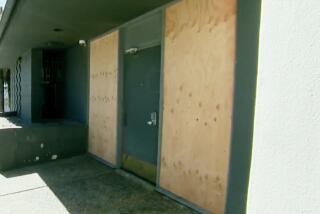Turkey, Israel Say Blasts Haven’t Shaken Ties
- Share via
ISTANBUL — The bombing of two synagogues here, purportedly claimed by Osama bin Laden’s Al Qaeda network, focuses attention on Turkey’s deep, lucrative relationship with Israel and raises questions whether Turkey is now paying the price for that friendship.
A statement sent Sunday to the London-based Arab-language newspaper Al-Quds Al-Arabi claimed Al Qaeda carried out the attacks during Saturday prayers because it had learned that agents from the Israeli Mossad secret service were using the synagogues. The authenticity of the statement could not immediately be verified.
For years, Jewish Israel and Muslim-but-secular Turkey have maintained military, economic, commercial and strategic ties. In a relationship based on regional isolation and the threat of common enemies, the two countries exchange intelligence, buy or sell everything from tanks and helicopters to water, and annually join in war games, the most recent, conducted with the United States, dubbed Reliant Mermaid.
Israeli investigators rushed to the wreckage left by the double car bombings and on Sunday picked through the ruins in search of clues. Specialized religious rescuers from Israel were also at work, and three additional bodies were recovered, raising the death toll to 23 people: six Jews, including an 8-year-old girl and her 85-year-old grandmother, and 17 Muslims.
Israeli and Turkish officials said Sunday that they would not let the bombings damage their relations.
“These attacks against prayers were cowardly attacks carried out by extremists who don’t want to see countries that are sharing values of democracy, freedom and rule of law,” Israeli Foreign Minister Silvan Shalom said after arriving in Istanbul and inspecting the devastation.
He laid a wreath in the knee-deep ruins at the Neve Shalom Synagogue, where Turkish residents had also scattered yellow and white chrysanthemums.
At the bombed synagogues, investigators were focusing on, among other elements, the ingredients used to concoct the huge car bombs in an effort to connect them to a string of attacks in Morocco, Tunisia and Kenya over the last 19 months -- all of which targeted Jews.
Security officials, speaking before Sunday’s purported Al Qaeda claim, told Turkish media that the two 850-pound bombs, detonated moments apart, appeared to be the well-planned work of Turkish extremists who were backed by foreign mentors. The discovery of bits of flesh on the steering wheel in a destroyed car in front of one of the synagogues seemed to confirm that the attacks were executed by suicide bombers. The Anatolia News Agency reported that DNA from the flesh was matched to a body found with wires attached to it.
Turkish leaders again denounced “international links” to the attacks, which wounded more than 300 people.
Among many Turks, the consensus was that their country, the epitome of moderate Islam, had been attacked because of its close relationships with Israel and with the United States. If a role by Al Qaeda is confirmed, hitting Turkey also illustrates the group’s ability to move closer and closer to Europe. Straddling two continents, Turkey is essentially a gateway to Europe.
Turkey has long rebuffed criticisms from the Arab world over its ties to Israel, an arrangement that has earned Ankara favor in Washington.
“The logical conclusion is that these attacks were aimed at undermining Turkey’s relations with Israel, the Jews and the United States,” said Dogu Ergil, an expert on Middle Eastern affairs at Ankara University.
Turkey was the first -- and for decades the only -- Muslim country to recognize the state of Israel, established in 1948. For many years, the ties were mostly symbolic. In the 1990s, with the end of the Cold War, both Turkey and Israel saw the benefits of improving trade, cultural and technological exchanges. Ankara upgraded its diplomatic mission to Tel Aviv in 1994.
In 1996, the two countries signed a multimillion-dollar military pact. Israel, constrained by its tiny size, would now be able to train combat pilots in the airspace over much larger Turkey. Turkey, often denied access to American arms because of its dismal human rights record, was able to buy equipment from Israel, including electronic systems to update its fleet of F-4 Phantom jets.
For Israel, reaching out to Turkey came as part of its strategy of jumping over hostile Arab neighbors and forming alliances with nations just beyond. And friendship with a Muslim country was very much a feather in Israel’s cap, a way to broadcast acceptance despite the unresolved conflict with Palestinians.
Turkey, too, needed an alliance with a powerful country like Israel to balance its poor standing among Arabs, whose antipathy toward Turks may well be a holdover from the days of the Ottoman Empire.
So, both Turkey and Israel saw themselves as outsiders.
“For Israel and Turkey, the relationship is a natural result of two isolated countries finding each other in the region,” said Metehan Demir, a Turkish expert on relations between the two countries. “It is a reality that Turkey and Israel are the two countries most hated by other Muslim nations in the region.”
Turkey also saw in Israel a proxy alliance to Washington.
The two countries share despised enemies: Syria, sandwiched between them, as well as Iran and, until recently, Iraq. Both nations also are bogged in a long fight against the national aspirations of an indigenous community -- the Kurds for Turkey, the Palestinians for Israel -- that has at times devolved into guerrilla warfare and terrorism. Both see themselves as oases of democracy in a sea of totalitarianism, increasingly under threat from radical Islam.
Paradoxically, the bombers who struck Istanbul’s largest synagogue, Neve Shalom, and a second temple, Beth Israel, acted at a time when the famous relations are not at their peak.
The election early this year of an Islamic party to lead Turkey’s government has made Israeli diplomats extremely nervous, though the government says it will hold up the country’s secular standards. Turkey has criticized Israel’s treatment of the Palestinians and recently quietly rejected Israeli Prime Minister Ariel Sharon’s request that he be invited to visit.
Still, Turkish Energy Minister Hilmi Guler is scheduled to travel to Israel in December to sign a deal in which Turkey will sell 50 million cubic meters of water annually to Israel. And 300,000 Israeli tourists have flocked to Turkey’s beaches and its architectural gem, Istanbul, in recent years.
The news agency Anatolia quoted senior police officials as saying the two vehicles were packed with a volatile cocktail of ammonium sulfate, nitrate and compressed fuel oil, wrapped in sacks and surrounded by detergent containers. The cars bore fake license plates, Anatolia said.
Four people were arrested, questioned and released, local news reports said.
For ordinary Turks, the shock of Saturday’s attacks was evolving into anger and dismay.
Selge Beduk, 31, and her husband, Goktan, were inside their apartment next door to the Beth Israel Synagogue when the roar, flames and shattering glass engulfed their lives. Both were badly cut. Both wore large white bandages across half their faces Sunday. Still, they expected their neighborhood to recover.
“This is a lively, peaceful street,” Selge said.
*
Times special correspondent Amberin Zaman contributed to this report.
More to Read
Sign up for Essential California
The most important California stories and recommendations in your inbox every morning.
You may occasionally receive promotional content from the Los Angeles Times.














